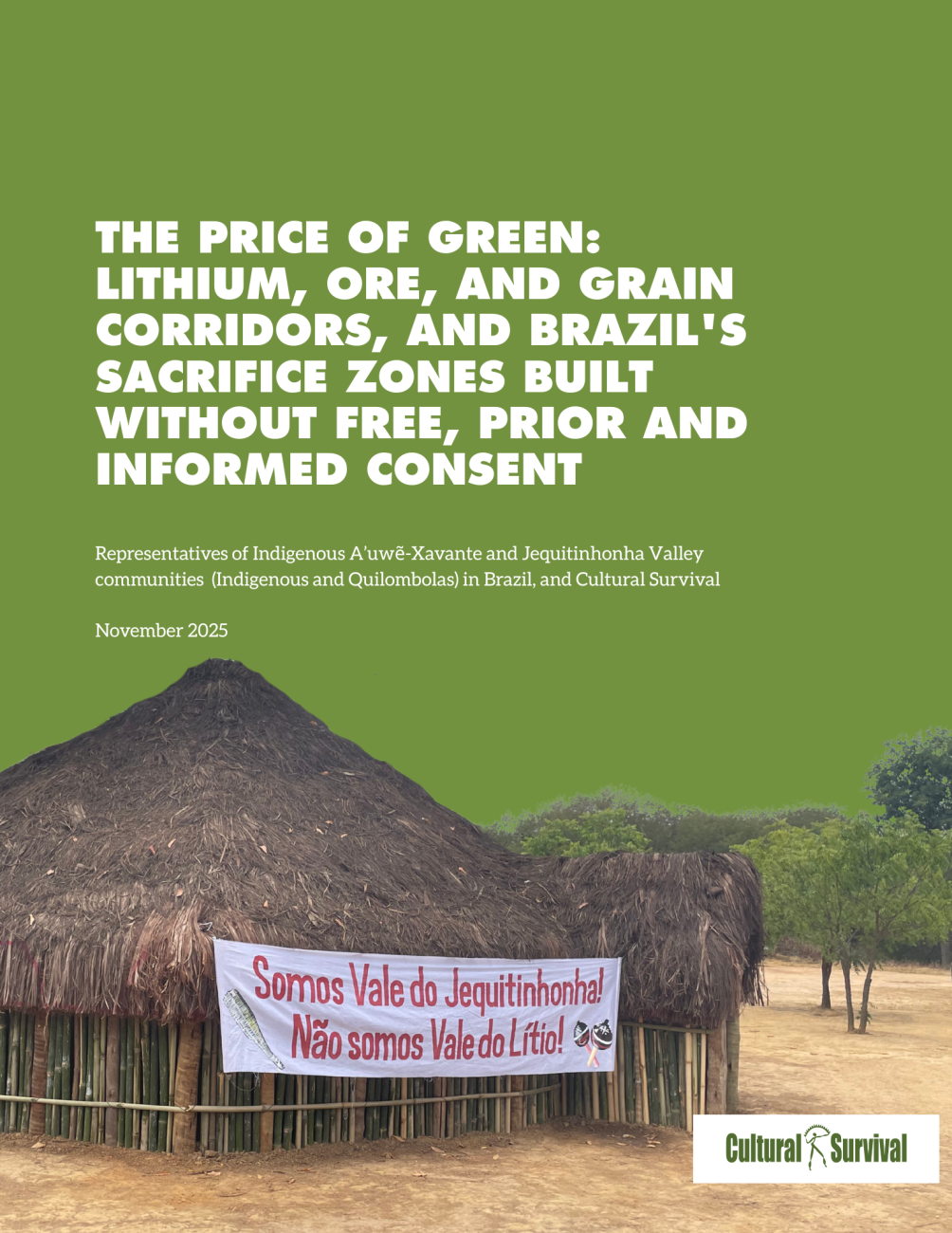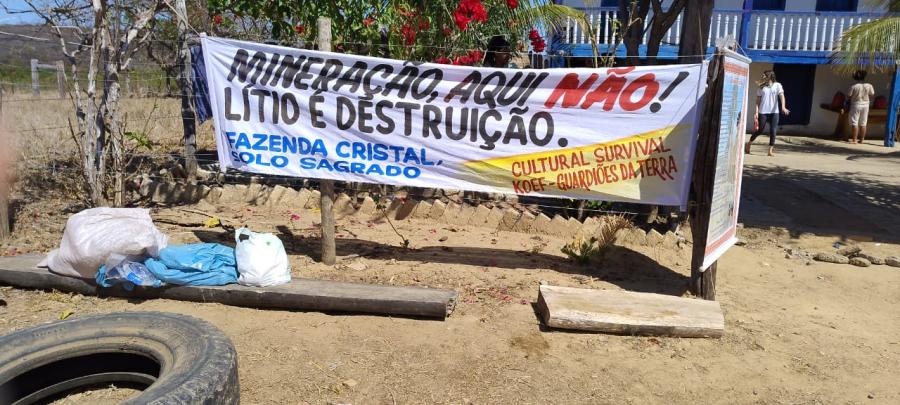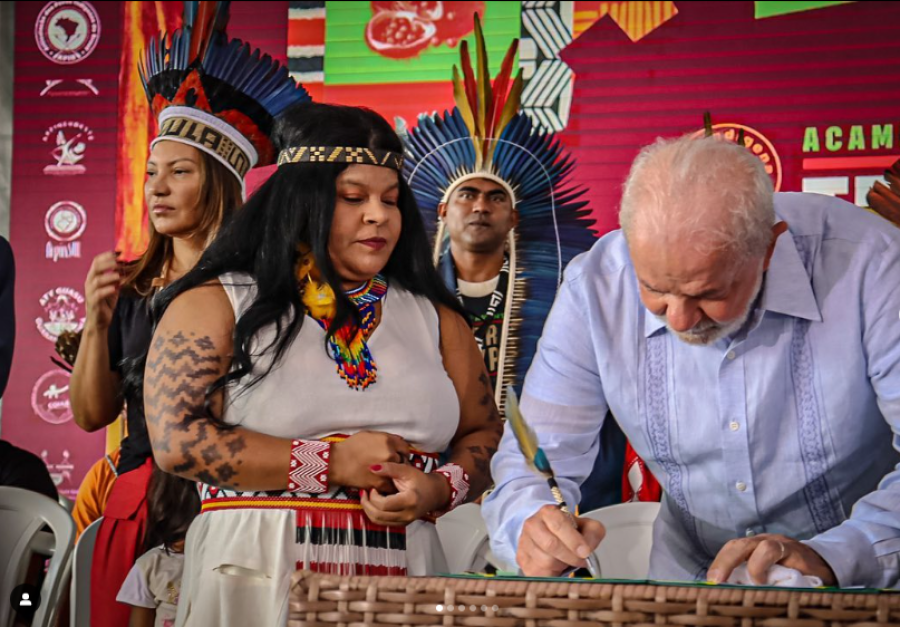
A'uwẽ-Xavante, Jequitinhonha Valley communities, and Cultural Survival document how Brazil finances mining without Indigenous consent using climate funds
Belém, Brazil / November 13, 2025 -- As Brazil prepares to lead global climate negotiations at COP30, a joint report by A'uwẽ-Xavante, Jequitinhonha Valley Indigenous and Quilombola communities, and Cultural Survival poses a fundamental challenge to Brazil's climate credibility: Can a country claim climate leadership while systematically financing projects that violate its own Indigenous Peoples' rights?
The answer, according to the report "The Price of Green," is stark. Brazil's National Development Bank (BNDES) channeled R$486 million from its Fundo Clima, a public fund designated for climate mitigation and sustainability, toward lithium mining that proceeds without Free, Prior and Informed Consent (FPIC) from 248+ affected Indigenous and Quilombola communities. The contradiction is not incidental. It is structural.
The Credibility Crisis: What It Means to Lead Climate Action
Climate leadership that silences the voices of those who have most successfully protected the planet is not climate leadership at all. Yet, that's what Brazil's projects do in the Jequitinhonha Valley and Cerrado. They bypass FPIC, exclude Indigenous decision-making, and extract from territories Indigenous Peoples have stewarded sustainably for generations. The message is unmistakable: Brazil's version of climate action requires Indigenous Peoples to be sacrificed, not heard.
"Our territories are being invaded, our futures are threatened, and our rights are systematically violated in the name of so-called progress. Lithium mining has transformed our territories into sacrifice zones to fuel Europe's energy transition. We are not against development; we are against a predatory model that violates life and destroys Mother Earth." --Djalma Ramalho Goncalves (Aranã Caboclo)
The case is Sigma Lithium. The company received over R$486 million from Fundo Clima for mining operations in a region containing 130 catalogued water sources and serving as a natural reservoir for Araçuaí and dozens of communities. The operations will generate 195.6 hectares of tailings, 30% more than comparable mines in Brazil. They violate Brazil's Constitutional mandates for cumulative impact assessments, and they violate international law requiring FPIC before activities affecting Indigenous territories.
"For us, material and immaterial heritage, the natural and supernatural, are inseparable. A stone has value, a cave has value. The company destroys soil and subsoil. Indigenous Peoples feel this deeply." -- Cleonice Pankararu (Toá Kãnynã Pankararu)
Beyond One Mine: The Systematic Pattern
Sigma Lithium is one aspect of a systemic problem in Brazil: sacrifice zones built on the dispossession and violation of the rights of Indigenous Peoples and Quilombolas. The Central-West Integration Railway (FICO) divides ancestral territories of 31,000 Indigenous peoples from 20+ ethnic groups in the Cerrado, the world's most biodiverse savanna and water source for the Amazon. Construction proceeds at 35% completion without genuine FPIC. Both projects advance under the justification of "clean energy" and "sustainable development" while systematically violating Indigenous Peoples' rights guaranteed by ILO Convention 169, UNDRIP, and Brazil's own Constitution.
Furthermore, FUNAI Brazil's state agency, charged with protecting Indigenous Peoples, has presented fragmented and selective information about FICO to different territories. A'uwẽ leaders characterize this strategy as "institutional harassment."
"If the Brazilian State intends to build infrastructure to export commodities, that cannot be on our lands and resources." --A'uwẽ-Xavante Leaders
The Question for COP30 and for the World
If Brazil cannot guarantee FPIC in its own climate-financed projects, its credibility to lead global climate action is compromised. Domestic consistency determines international authority.
The report is clear: Brazil's climate leadership is hollow as long as Indigenous Peoples' voices are silenced on decisions affecting their own lands. This is not just an Indigenous rights issue. This is a climate credibility crisis.
What Credible Climate Leadership Requires
- Immediately suspend Sigma Lithium, FICO, and Agro Xavante operations until genuine FPIC is obtained from all affected Indigenous communities
- Urgently complete land demarcation of Aranã, Pataxó, and Pankararu territories in Minas Gerais and undelimited zones in Mato Grosso
- Conduct independent cumulative impact assessments with full participation of Indigenous Peoples and Quilombola communities
- Investigate allegations of institutional harassment by FUNAI
- Establish direct access to climate finance for Indigenous-led organizations and platforms
Read the report: "The Price of Green: Lithium, Ore, and Grain Corridors, and Brazil's Sacrifice Zones built without Free, Prior and Informed Consent."
Media Contact:
Agnes Portalewska agnes@cs.org



